- Home
- Craig Schaefer
A Plain-Dealing Villain Page 13
A Plain-Dealing Villain Read online
Page 13
“Stow the tough-guy act.” Trevor gestured around us with his glass. At the corner of my eye, a new shadow crawled along the edge of the bar. “You can’t touch me in here. And as far as outside goes? Buddy, I know everybody in this town, and everybody knows me. I can make your visit a short one. Real short.”
“You know Damien Ecko?”
“Course I do,” he said. “Why?”
“Maybe you should keep up on current events. Somebody broke into Ecko’s store tonight and left two corpses on the carpet. They took that dagger from his personal safe.”
Trevor didn’t answer. He just stared at me while the color leeched from his face.
“Two ways this can go,” I said, “both of them bad. The cops can catch my ex-partner, and the dagger’s trail leads right to your doorstep. Or Ecko catches him, and the trail leads right to your doorstep. I don’t see either of those options building up to a happy ending for you.”
“Hey, I didn’t know. I talked to the guy yesterday. All he said was he needed a bundle of quick cash, and he was about to get his hands on something that might be up my alley. I had no idea who he was going to steal it from.”
“I believe you,” I said. “But Ecko? He’s gonna think you set this whole thing up. I can help you, all right? I can make this problem just—poof—go away. But you’ve gotta level with me.”
He squeezed his glass harder, to stop his hand from shaking. It didn’t work.
20.
“The meet is supposed to go down in about two hours,” Trevor said, sounding defeated. “He’s bringing the dagger, and if it checked out, I was going to give him fifteen large. I’ve got a contact in New Orleans who’s big on Mesoamerican stuff, figured I could spin it and make a quick buck.”
Fifteen large. If Stanwyck had stuck with me and stayed loyal, I would have paid him just shy of nine. Augie was dead with a bullet in his brain, and Coop was trapped in his own rotting corpse, all for the sake of six thousand dollars.
“He said he needed the money fast, huh?”
Maybe my tone had changed, or maybe it was the look on my face, but Trevor edged away from me on his barstool.
“I didn’t…I didn’t ask for details,” he said. “None of my business. Look, you’ve got to keep my name out of this—”
“We never had this conversation. Just tell me where the meet’s going down. I’ll take care of everything. You’ll never hear from this guy again, I promise you that.”
Trevor drummed his fingers on the bar, thinking.
“I don’t like doing business with new clients at my store,” he said. “Too risky. Never know who you’re really gonna meet. There’s a place off West 79th, down on the south side. It’s a shuttered-up convenience store owned by some friends of mine.”
He rested his hand on the bar and slid it my way. When he pulled his fingers away, a tarnished set of keys sat next to my glass. They dangled from a cheap tag with a street address scrawled under translucent plastic.
“He’ll be expecting me there,” Trevor said. “Waiting for him.”
“Hope he likes surprises,” I said and scooped up the keys.
Back in the conversation nook, Amy had already made herself scarce. Halima and Freddie gave me a curious look. I jingled the keys.
“I know where Stanwyck’s going to be. With the dagger. If you ladies will excuse me, I need to go have a word with him.”
“Call me when it’s over, so I know you’re all right,” Halima said. She glanced at Freddie. “Want to get a late dinner?”
Freddie smiled, but there was something sad at the edges of her eyes.
“You know me,” she said. “I’m always hungry.”
* * *
The cabbie, an Armenian with bushy black caterpillar eyebrows, stared at me in the rearview mirror when I read him the address.
“That’s in Auburn Gresham.”
“Problem?”
His lips twisted in a patronizing smile.
“You’re not from around here.” It wasn’t a question.
“Not a big tourist crowd there, I take it.”
“I don’t go to Auburn Gresham after dark.” He shook his head. “No way. Closest I can get you…mmm, three blocks from that address.”
“Then I guess I’m going to get some light exercise.”
He muttered something under his breath. I assumed it was Armenian for “crazy asshole.” Still, true to his word, he drove me down to the south side of the city and pulled over on the edge of a dark, lonely backstreet.
“Walk that way,” he said, pointing straight ahead as I passed him a rumpled twenty. “Three blocks, on your left. Don’t get shot.”
“I’ll make an effort.”
He responded with a shake of his head and muttered under his breath again. I didn’t need a translation. He pulled a U-turn and left me standing alone.
The dark smooths things out, hides the blemishes that show under a noonday sun. I walked along a row of brick bungalows that wouldn’t have looked out of place in a Norman Rockwell painting. Neatly cut lawns, not a stray brick or a scrap of trash in sight. Cities talk, though, and you can get the lay of the land if you learn how to listen. The bars behind vintage windows, the alarm-company signs on reinforced front doors, those were the first hints that I was in troubled territory.
The gunshots were next. One dull, basso thump and then three quick reports, a staccato burst coming from a block or two away. Then silence. No lights went on. Nobody came running out of their houses. It was as if nothing had happened at all.
I hit a commercial corridor cutting down the middle of the neighborhood. Heavy iron grates sealed the front door of a jerk chicken joint. Across the street, sheets of plywood covered the broken front window of a camera shop, the wood freshly tagged with the letters GD in thick calligraphic script. The street felt like the diseased pulp at the heart of a rotten tooth.
Red and blue lights strobed along alley walls. Cops had a trio of shirtless, sullen teenagers in blue bandannas up against their car, the hood piled with confiscated steel. I walked faster. I wasn’t afraid of the neighborhood, but I didn’t have an excuse for being there. Not one a cop would want to hear, anyway.
The convenience store stood on a desolate corner, windows shuttered and lights dead. It butted up against an abandoned dry cleaner’s on one side and an abandoned cell-phone store on the other, nothing left but corroded bars, broken glass, and dust. I shot a look over my shoulder, making sure I was alone, and let myself in. The front door—all the glass broken out and replaced by layers of thick plywood—swung shut at my back.
My eyes slowly adjusted to the gloom. Maybe the store had thrived once, but now nothing was left but aisles of empty shelves and some stray dented tin cans a few years past their sell-by date. A door hung open behind the checkout counter, leading farther into the building. I crept toward it, listening to the warped linoleum crackle under my shoes. I needed to make sure the place was empty. Didn’t want anyone interrupting the fun once Stanwyck showed up.
Like I’d told Halima and Freddie, I needed to have a talk with the man. And I was going to take a good, long time doing it.
Beyond the door was a stub of a hallway ending in two opposite-facing openings. A stockroom and a washroom, I figured. The doors were long gone, nothing but bare hinges left on the dingy frames.
In the darkness, a child giggled.
I froze. A faint glow emanated from the left-hand doorway, like a lit match shrouded in a stranger’s hand.
I eased my way toward the opening and peeked around the corner. In the middle of a filthy bathroom, the fixtures ripped out and nothing but exposed pipes left behind, light glowed from a crack in the world. It hung in the open air, a jagged cut in space.
Tiny hands reached out from inside the crack and forced it wide. Inch by inch, the creature on the other side wrenched itself halfway through. It looked like someone had taken a cherubic baby doll and tossed it in a furnace, charring its waxy skin. It looked up at me with wide red eye
s and giggled again, falling through the crack and tumbling to the bathroom floor with a wet plop.
The imp stood up on wobbly, fat little legs and raised its mangled hand. A gush of heat washed over my face, carried on a wind that stank of excrement. Then came a billowing crump of superheated air as the floor around the baby’s feet ignited.
Trevor. Instead of giving up Stanwyck, he’d lured me to the middle of nowhere and summoned up a demon to take me out. Assassination by proxy.
Fine, I thought with a snarl. Everything Stanwyck’s got coming, you get it too.
One card leaped from my hip pocket. The ace of spades. I twirled my fingers and sent it lancing through the air, straight for the imp’s throat. It never made it. A globe of air shimmered around the squat, misshapen body and the card ignited, leaving nothing but a pile of ash.
The baby raised its hand and wagged a tiny clawed finger at me as it giggled.
A half dozen banishing rituals flickered through my mind, like a chef contemplating a recipe book. I had plenty of ways to get rid of the thing—and every one of them required gear I hadn’t brought with me. Time was my only advantage. Without a body to hijack, the imp wouldn’t be able to stay for long before getting sucked back into hell.
Discretion was the better part of valor. I ran for the front door. I hauled it open, tasting fresh air, just long enough to see three things: the sedan parked at the curb, Stanwyck in the driver’s seat, and the silenced pistol in his hand. I jumped back as his gun coughed and a bullet whined past my ear like an angry hornet. I slammed the door closed.
The imp had followed me into the store. It performed a clumsy cartwheel and a pirouette, pointing this way and that, and more crumps of air made my ears pop as the walls and ceiling burst into fast-growing blossoms of fire wherever it gestured.
Stanwyck had his gun on the door, and he wouldn’t miss a second time. Those were my options: burning or a bullet.
I sprinted past the imp and down the back hallway, jumping a streak of flame as it erupted under my feet. The stockroom was as empty as I feared. A few broken metal shelves rusted in the gloom, and moonlight streamed through a couple of windows set high in the wall, each one about the size of a shoebox. No way out. I spun around.
The imp stood on the threshold. It gave me a playful grin, flashing flame-blackened teeth, and stretched out its claws.
21.
At the imp’s unspoken command, tiny fires exploded from the walls and floor around me, filling the stockroom with lethal clouds of roiling black smoke. The building rumbled as something crashed out in the storefront, the fire loosening chunks of ceiling and lashing at the foundations.
I stumbled back against the sidewall, my shoulder hitting peeling white plaster. It bent.
I blinked, put my hand to the wall, and pushed. The rotten wood underneath flexed and a chunk of plaster fell free. As I grabbed one of the broken shelves and pulled it over, sending it crashing to the floor, I tried to picture the building’s layout. If I guessed right, this room butted up against the back of the dry cleaner’s next door.
Building’s an antique, I thought feverishly as I grabbed the shelf with both hands and wrenched at the groaning metal. Cheap materials. Nobody checking for fire-code violations. Walls weren’t strong to begin with.
The shelving support snapped free, leaving me with a stout metal pole about three feet long. I braced it like a spear and slammed it into the wall where it felt weakest. Then again and again, as the growing smoke flooded my stinging eyes with tears.
The imp chittered and cooed, dancing in the fire. It could have ignited the ground under my feet, but the creature was just smart enough to be sadistic. It was taking its time, enjoying the struggle.
On my third hit, the pole pierced through the wood and left a fist-sized hole in its wake. Coughing, I pressed my mouth to the breach and sucked down a quick lungful of fresh air, then dug my hands in and grabbed the rough edges of the wood. I braced one foot against the wall, knee bent, and hauled back with every ounce of strength I had left.
The rotten plywood buckled, driving jagged splinters into my palms. I gritted my teeth against the pain and did it again. One more try and I’d torn open a gap wide enough to squirm through. The imp let out an enraged squeal when it figured out what I was doing, but not before I pulled myself through the opening with bloodied hands.
Smoke and firelight followed me into the abandoned dry cleaner’s. Hulks of old laundry machines sat silent in the dark. I vaulted a rusted folding table and ran all-out, my sights on the back door. I threw my shoulder into it at full speed. It felt like I’d been kicked by a mule, but the door burst open, sending me stumbling over my own feet and tumbling onto the concrete in the back alley behind the store.
I pushed myself up on my knees, coughing until my throat felt like a piece of raw meat, and forced myself to keep moving. I clutched my sore shoulder as I stumbled up the alley, leaving the imp’s furious squealing and the flames behind.
Sirens in the distance. I walked as fast as my body would let me, trying to get away from the oncoming lights. No sign of Stanwyck out front. He must have figured the imp killed me. He’d regret that. He’d regret a lot of things. I picked splinters from my hands in the dark and tossed them to the sidewalk, each jagged wooden needle leaving drops of cherry blood in my wake.
* * *
I made it to the Hermetic Inquiry, Trevor Manderley’s shop in Wicker Park, about half an hour before sunrise. He was too cheap to spring for a decent alarm, but he’d wrapped the entire building in barbed-wire coils of warding hexes. He should have paid for the alarm. I sliced through his spells like a red-hot scalpel, fueling my power with adrenaline and anger, and let myself inside.
The place was pure dabbler kitsch, with shelves of lurid paperbacks promising to teach the mysteries of the universe, grant cosmic occult power, and make your acne disappear overnight. A wall held racks upon racks of herbs in big glass bell jars, and I could tell at a glance that half of them were mislabeled or cheap substitutes at best. “Genuine consecrated amulets” hung on a rack up front, fifty bucks each and about as magical as dry toast. Trevor made his money selling dreams that came pre-broken. At least when I robbed somebody, they knew they’d been taken.
I found what I was looking for in the back, in Trevor’s office: a magic circle drawn on the concrete floor in bright orange chalk, with little piles of grainy yellow sulfur at the points of the star within. A bronze idol stood at the heart of the circle, about a foot tall and depicting a leering man with hair of flame. Moloch, read the chiseled inscription at the base.
I picked up the idol. It was heavy. Warm, too, like it had lava in its belly.
Out front, keys jiggled in the door’s lock. I killed the light, stood to one side, and waited for him to come in the back room. Trevor was just sharp enough to realize something was wrong. I knew, because I saw the look on his face change and his eyes widen a split second before I swung for the fences and cracked the base of the idol against the back of his skull.
I was nice enough to bandage his head while he was unconscious. Didn’t want him bleeding out. Then I dragged him into the storefront. When he finally came to, he was down on the floor with one wrist tied to a radiator by thick strips of knotted leather. I’d used a few of his “magical” amulets. Bound his ankles, too, to keep him from kicking too much.
“It’s not what it looks like,” were the first words out of his mouth. Maybe it was just the fear, but even he didn’t sound like he believed it.
I leaned against the counter by the cash register and crossed my arms.
“Really? Is that how we’re going to play this?”
“You—you backed me into a corner! I already have a buyer lined up for that dagger. I’d paid Stanwyck. I couldn’t trust you wouldn’t lead Ecko or the cops to my front door.”
“Well,” I said, “that’s good. Because you definitely don’t have to worry about Ecko or the cops anymore.”
I stood aside, letting him see
what I’d brought with me, sitting high on the counter.
A red plastic can of gasoline and a brand new lighter.
“Wait,” he said. “Wait, wait—” And that was when I strode over, upended the can, and poured gas over his head. He sputtered and shook his soaked hair wildly, pulling against the radiator and kicking out with his bound feet. I gave him a few more dollops and walked away, setting the can down, picking up the lighter.
“What are you doing?” he cried.
I shrugged. “You were going to burn me, Trevor. Just returning the favor.”
“You don’t have to do this. I can pay you!”
“The dagger,” I said. “Where is it?”
He squinted at me through teary eyes. “You don’t understand. The guy I promised it to, my guy in New Orleans, he’s not the kind of person who does take-backs. He’s already wired the payment—”
I held up the lighter.
“Fun science fact,” I told him. “In a gasoline fire, it’s not actually fire touching the gas that ignites it. No. It’s the gasoline vapors that ignite first, and the fire flows back to the liquid from there. You can ignite gasoline from a lot farther away than you’d think.”
I flicked the lighter’s wheel, showing him the tiny flame from ten feet away. Then I took a step toward him.
“Wait! We can make a deal. I can give you Stanwyck—”
“What do you think?” I said, taking another step toward him. “How close will I get before you go up like a Roman candle? Nine feet? No, not nine feet, so let’s try eight—”
Trevor’s free hand flailed, holding out his open palm like he could stop me by force of will. “Stop! Okay, okay, damn it. Under the cash register. There’s a safe behind the wood.”
I clicked the lighter off and crouched down behind the front counter. Sure enough, a black iron safe with a rotary dial hid behind a sliding panel.
“Combination?”
He curled up his knees, wet and miserable. “You’re killing me here, you know that? You’re literally killing me.”

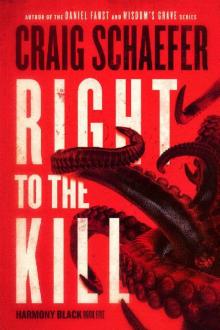 Right to the Kill (Harmony Black Book 5)
Right to the Kill (Harmony Black Book 5)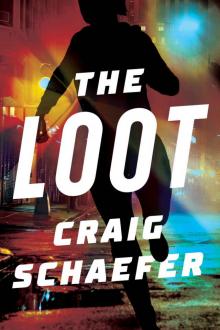 The Loot (Charlie McCabe Thriller)
The Loot (Charlie McCabe Thriller)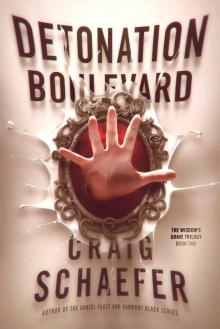 Detonation Boulevard
Detonation Boulevard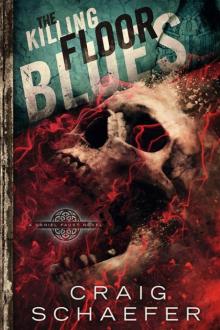 The Killing Floor Blues (Daniel Faust Book 5)
The Killing Floor Blues (Daniel Faust Book 5)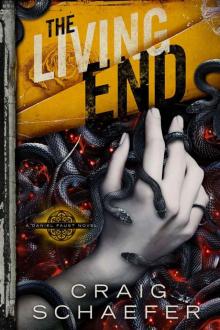 Daniel Faust 03 - The Living End
Daniel Faust 03 - The Living End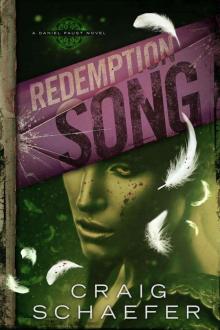 Redemption Song (Daniel Faust)
Redemption Song (Daniel Faust)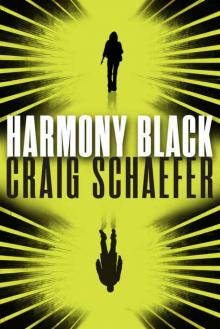 Harmony Black (Harmony Black Series Book 1)
Harmony Black (Harmony Black Series Book 1)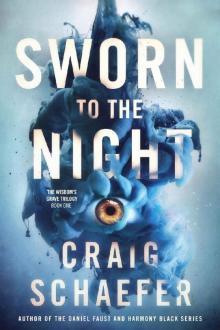 Wisdom's Grave 01 - Sworn to the Night
Wisdom's Grave 01 - Sworn to the Night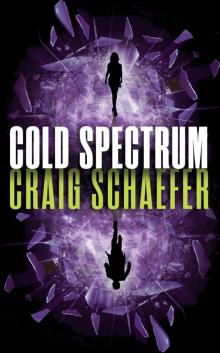 Cold Spectrum
Cold Spectrum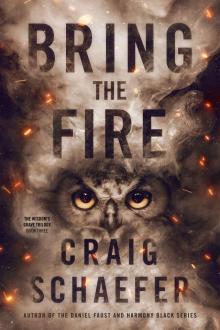 Bring the Fire (The Wisdom's Grave Trilogy Book 3)
Bring the Fire (The Wisdom's Grave Trilogy Book 3)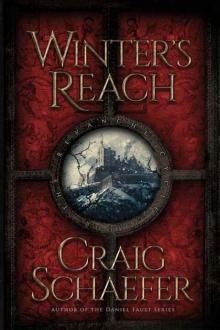 Winter's Reach (The Revanche Cycle Book 1)
Winter's Reach (The Revanche Cycle Book 1)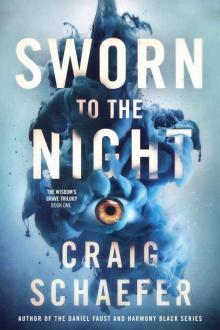 Sworn to the Night (The Wisdom's Grave Trilogy Book 1)
Sworn to the Night (The Wisdom's Grave Trilogy Book 1)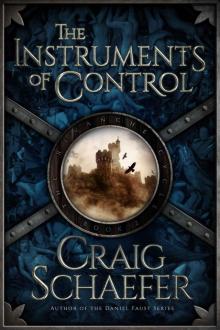 The Instruments of Control (The Revanche Cycle Book 2)
The Instruments of Control (The Revanche Cycle Book 2)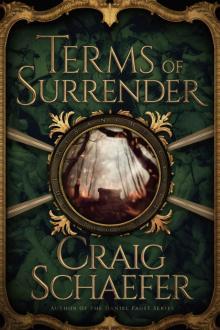 Terms of Surrender (The Revanche Cycle Book 3)
Terms of Surrender (The Revanche Cycle Book 3)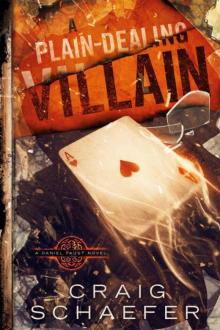 A Plain-Dealing Villain
A Plain-Dealing Villain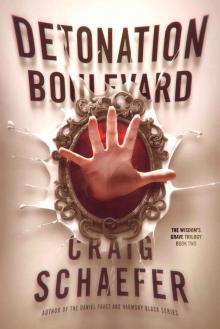 Detonation Boulevard (The Wisdom's Grave Trilogy Book 2)
Detonation Boulevard (The Wisdom's Grave Trilogy Book 2)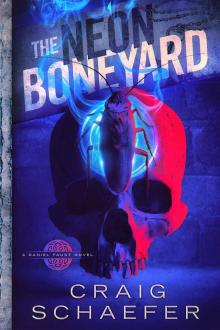 The Neon Boneyard
The Neon Boneyard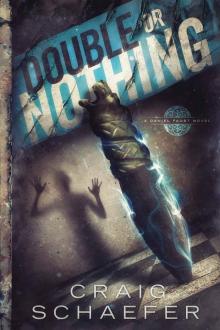 Double or Nothing (Daniel Faust Book 7)
Double or Nothing (Daniel Faust Book 7)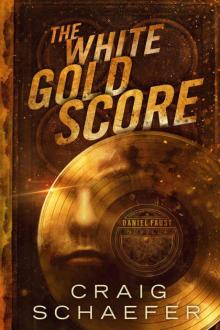 The White Gold Score (A Daniel Faust Novella)
The White Gold Score (A Daniel Faust Novella)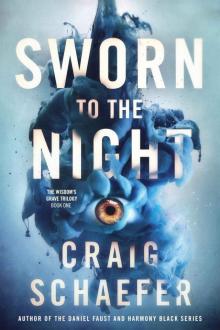 Sworn to the Night
Sworn to the Night